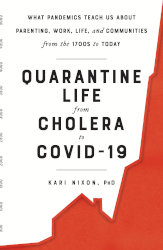 LEX Copyright Iroda |
|||
| E-mail: lexcopy@lexcopyright.hu – írjon nekünk! | |||
| Céginformáció | Újdonságok | Szerzőink | |
| Képviseleti lista | In English | ||
QUARANTINE LIFE, FROM CHOLERA TO COVID-19

What Pandemics Teach Us About Parenting, Work, Life, and Communities from the 1700s to Today,
Tiller Press - June 2021
Tag line: For readers of Mary Roach and Adam Diamond, an innovative look at the histories of different epidemics and what it meant for society, alongside what lessons different diseases have to teach us as society battles the novel Coronavirus.
About QUARANTINE LIFE: Throughout history, there have been numerous epidemics that have threatened mankind with destruction. Diseases have the ability to highlight our shared concerns across the ages, affecting every social divide from national boundaries, economic categories, racial divisions, and beyond. Whether looking at smallpox, HIV, Ebola, or COVID-19 outbreaks, we see the same conversations arising as society struggles with the all-encompassing question: What do we do now?
QUARANTINE LIFE, FROM CHOLERA TO COVID-19 demonstrates that these conversations have always involved the same questions of individual liberties versus the common good, debates about rushing new and untested treatments, considerations of whether quarantines are effective to begin with, what to do about healthy carriers, and how to keep trade circulating when society shuts down.
This immensely readable social and medical history tracks different diseases and outlines their trajectory, what they meant for society, and societal questions each disease brought up, along with practical takeaways we can apply to current and future pandemics—so we can all be better prepared for whatever life throws our way.
About the author: Kari Nixon is a professor specializing in social reactions to infectious disease. She works at Whitworth University, where she teaches about social responses to contagion and quarantine in medical humanities and Victorian literature courses. Her work on public health has been published for lay audiences in HuffPost, YES! Magazine, and CNN. Her academic book, Kept From All Contagion: Germ Theory, Disease, and the Dilemma of Human Contact, was published by SUNY University Press, and tracks the social history of humankind’s responses to disease in Victorian literature and popular culture. She regularly teaches about zombies, medical ethics, the problematic pressures on the health care system, and social justice issues for marginalized races and genders. She has edited numerous books on diseases in society.
Why we love QUARANTINE LIFE: This timely book really puts our modern era (and our modern freaking out about COVID) into perspective! QUARANTINE LIFE shows us how disease is something that society has always had to deal with, and always will. Reaching back into history to look at how people responded to smallpox, plague, and cholera, this work provides surprisingly prescient lessons about how people respond to pandemics. Who knew that a novel from the 1720s describes the exact same reactions that we see to COVID-19 today: people unwilling to surrender their individual liberties for the collective good and resisting health recommendations placed upon them that do not align with personal interests. And surprisingly, people in the past used the exact same techniques that we are using today to cope with disease—social distancing, wearing masks, and curbside pick-up! As an English professor who focuses on contagious diseases and how society reacts to them (a medical humanist) author Kari Nixon has a unique perspective on this topic, and makes a compelling argument for how science and medicine are always a product of social attitudes. Her writing is wonderfully easy to read and very accessible, not at all filled with medical jargon. The book especially makes you ponder about the changed relationship we have to disease and death now that modern medical advancements have lessened our need to deal with such unpleasantries. It’s an extremely important read that reminds us that we will always live with disease, so we need to look at the lessons of the past to remember how to cope in the future.
Favorite lines:
What I mean here is that life preserved at any cost is not going to be the same form of life we tried to preserve in the first place.
People will always exploit disease as a way to fuel prejudices they already have.
Our deepest moments of learning do not occur where we’re comfortable.
We’re comfortable with what we know. We’re comfortable with what we’re used to. That comfort, by definition, does not add to or challenge the world as we know it. Deep, meaningful moments of learning and growth cause discomfort. They often happen in our lowest lows. But sometimes, this just means that we’re challenged to question a belief we’ve always had, or an assumption we didn’t realize we built long ago.
| 1054 Budapest, Szemere u. 21. Tel: (06-1) 332-9340 Fax: (06-1) 331-6181 | |||
| Info | |||